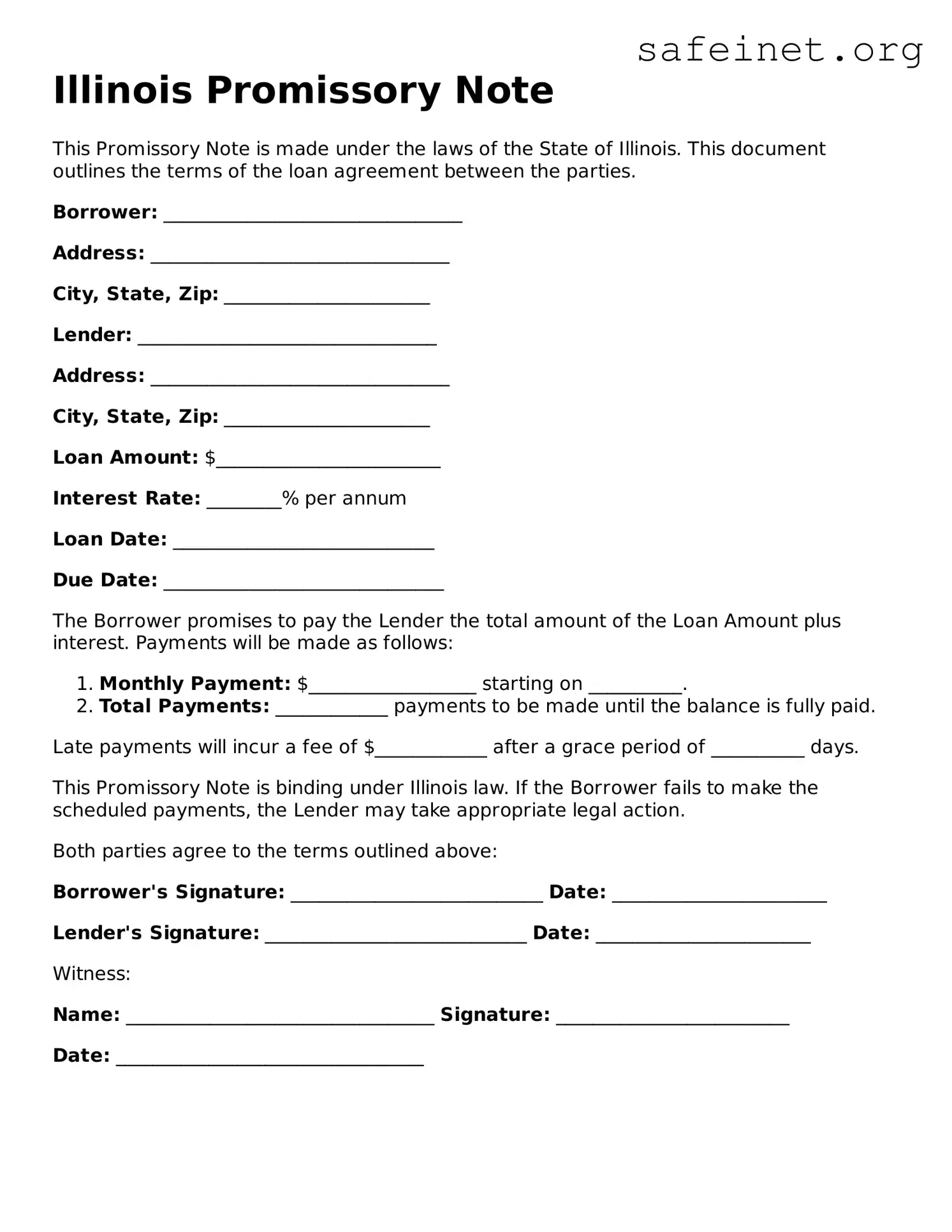The Illinois Promissory Note form bears resemblance to a Loan Agreement, which is a comprehensive document that outlines the terms and conditions under which a borrower receives funds from a lender. While both serve the purpose of formalizing a loan, a Loan Agreement often goes into greater detail, specifying guarantees, default terms, and repayment schedules. It helps both parties understand their obligations clearly, providing a more extensive framework than a simple promissory note.
Another document that aligns with the Illinois Promissory Note is a Personal Loan Agreement. Typically used for loans between individuals, this document formalizes the terms of personal lending, including interest rates, repayment timelines, and collateral, if applicable. Like a promissory note, it legally binds the borrower to repay the loan. However, a Personal Loan Agreement may include more nuanced clauses to protect the lender's interests due to the informal nature of personal loans.
A Business Loan Agreement also resembles the Illinois Promissory Note, especially in its structure and purpose. Designed for business transactions, it outlines the loan amount, interest rates, and repayment schedules. This agreement also typically includes clauses that address potential risks and obligations of both parties in a more formal business context than a personal transaction. Parties benefit from knowing their rights and duties, which helps establish trust and accountability.
The Conditional Sales Agreement shares similarities with the Illinois Promissory Note in that it is a financing agreement used to secure payments for goods sold. In this document, ownership of the goods remains with the seller until the buyer has fulfilled the payment terms. While the purpose is to ensure that sellers receive payment, akin to a promissory note, the Conditional Sales Agreement also allows for the repossession of goods if the buyer defaults.
An IOU, or informal acknowledgment of debt, can be likened to a promissory note as it serves to recognize that money is owed. However, an IOU is often less formal and does not include specific payment terms or interest rates. While an IOU can be an initial step in documenting a debt, a promissory note carries more weight in legal terms and typically provides clearer obligations regarding repayment.
A Secured Promissory Note is another document directly related to the Illinois Promissory Note. This version of a promissory note specifies that the loan is backed by collateral. In this case, if the borrower defaults, the lender has the right to claim the asset listed as collateral. This added layer of security for the lender represents a significant distinction from an unsecured promissory note, which does not have this provision.
The Mortgage Note, used in real estate transactions, is akin to a promissory note in that it involves a borrower's promise to repay borrowed funds. However, a Mortgage Note specifically applies to a loan used for purchasing real estate and is typically secured by the property itself. This document outlines critical details like the loan amount, interest rate, and repayment plan while incorporating specific mortgage terms related to property ownership.
A Student Loan Note shares fundamental characteristics with the Illinois Promissory Note, as both document a borrower’s obligation to repay borrowed money. Specifically designed for educational expenses, the Student Loan Note includes information about the loan amount, repayment schedule, and interest rates. Its structure helps student borrowers understand their financial commitments, paralleling the clarity provided by a standard promissory note.
Finally, a Guarantee Agreement can also be compared to the Illinois Promissory Note. This document often accompanies a loan by ensuring that a third party becomes responsible for repayment should the primary borrower default. While the promissory note binds the borrower, a Guarantee Agreement adds an additional layer of security for lenders, assuring them that someone else will be liable for the debt if necessary.
